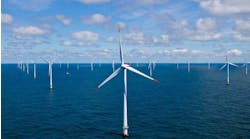Jeremy Beckman * Editor-Europe
LONDON – The North Sea Transition Authority (NSTA) has awarded 21 licenses to 14 companies under Britain’s first carbon storage licensing round.
These cover depleted oil and gas reservoirs and saline aquifers in the North Sea and East Irish Sea spanning a total area of 12,000 sq km.
Potentially, the locations could store up to 30 MM metric tons/yr of CO2 by 2030, equivalent to 10% of the UK’s emissions in 2021.
Shell, Perenco and Eni all gained licenses off the Norfolk coast in the southern North Sea that could form part of the planned Bacton Energy Hub – a carbon storage, hydrogen and offshore wind project, designed to provide low-carbon energy to London and south-east England.
Other locations are at sites off the coasts of Aberdeen, Teesside, and Liverpool.
The NSTA estimates up to 100 storage licenses will be needed in time to meet the Government’s net-zero targets. The Authority will assess opportunities in other locations before determining when to stage a second round.
It has already granted six licenses and the Government recently announced £20 billion ($24.87 billion) of support to help these projects move forward. Hynet in the north-west and the East Coast Cluster were selected as Track 1, and the Acorn and Viking CCS projects in the southern North Sea as the Track 2 clusters.
The cluster sequencing process is designed to give industry the certainty it needs to push ahead with carbon storage.
Offshore Energies UK sustainability and policy director Mike Tholen said: “We have an oil and gas industry with the right expertise, skills, and people needed to make this a British success story, and these licenses are another step towards achieving that goal.
“If we get this right, it could not only significantly reduce the UK’s carbon footprint, but position us as world leaders in the low carbon space – creating opportunities for UK people and businesses and playing on our industrial strengths…
The companies investing in nascent opportunities like carbon storage will require the cash flow from a stable and predictable oil and gas business to fund these technologies. That is why we need continued support from government across the whole energy landscape, and long-term, competitive energy policies that attract the investment and innovation we will need to make sure these solutions are being built in the UK, for the UK.”
Harbour Energy said it had been awarded four carbon storage licenses in the southern North Sea. Two are adjacent to and west of its Viking CCS carbon storage license: the company operates the Viking CCS CO2 transportation and storage network in partnership with bp.
The new awards could increase the total storage capacity of Viking by over 50%. Harbour also has a 30% stake in the Storegga-operated Acorn CCS project in north-east Scotland, which secured two further storage licenses.
09.15.2023




